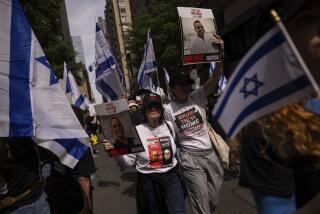Communist China celebrates 60th anniversary with instruments of war and words of peace
- Share via
BEIJING — At the end of a gala Thursday celebrating communist China’s 60th anniversary, President Hu Jintao and his predecessor, Jiang Zemin, got down from their rostrum and joined hands with the dancers in Tiananmen Square.
It was a symbolic gesture designed to soften the image of a remote and authoritarian leadership that had been reinforced by a military parade earlier in the day.
But the day of festivities was like that, full of contrasting images and a hodgepodge of sometimes contradictory slogans. The People’s Liberation Army paraded the weapons of war -- missiles, fighter jets, tanks -- while commentators in the official media waxed on about the nation’s love of peace.
Slogans about “democracy,” “reform,” “opening up” and “a new era of progress” were at odds with the way they were spelled out by 80,000 Beijing students, who appeared less like human beings than pixels in a digital photo as they lifted colored pompoms to form Chinese characters. The depersonalizing technique has been discredited in recent years because of its associations with North Korea’s dictatorship.
Propaganda extolled the harmonious relationship between China’s ethnic groups, but there were few minorities at the event. Dancers dressed in colorful headdresses and costumes appeared to be Han Chinese masquerading as ethnic minorities.
Security around Beijing was extraordinarily tight because of fears of terrorism or protests by Uighurs and Tibetans.
“Xinjiang people show their appreciation by happily singing and dancing,” intoned a commentator from China radio without a trace of irony, referring to the western region where at least 200 people were killed and thousands injured July 5 in China’s worst ethnic rioting in decades.
The military parade celebrating the 60th anniversary of the Communist Party’s rise to power was billed as the largest ever in China, but its staging followed the hackneyed formulas of parades past. There were the same formations of goose-stepping soldiers and the floats looked like they’d barely been refurbished from the 1980s, with replicas of cows and tractors publicizing agricultural achievements.
“Socialism with Chinese characteristics,” a concept developed by the late Deng Xiaoping in 1984, was the phrase heard most often in official commentary.
The leadership watched from high above, on a rostrum in front of the Forbidden City, from which Chinese emperors used to hand down edicts. When Hu ventured out to review troops, he glided past in a 21-foot-long limousine with an open roof so that he protruded like the severed upper half of a statue. His body was almost entirely immobile as he intoned repeatedly into five microphones on the limousine’s roof, “Dongzhimen hao” -- “Greetings, comrades.”
The evening gala was more joyous, bringing back some of the glitz of last year’s Olympics. Film director Zhang Yimou, who staged the Olympics opening and closing ceremonies, designed a spectacular display of fireworks that looked like 60 candles. The vast expanse of Tiananmen Square was filled with dancers, many of them holding colored lights. It appeared that fewer than 10,000 people observed the festivities live, with everyone else ordered to watch on television. Authorities closed many hotels and evacuated nearby residents.
Technicians used cloud-seeding measures the night before to deliver a rain shower that cleared the air. The result was the sky repainted a Technicolor shade of blue rarely seen in nature (at least not in Beijing) and the air so unusually clear that spectators in the viewing stands complained afterward of sunburn.
--
More to Read
Sign up for Essential California
The most important California stories and recommendations in your inbox every morning.
You may occasionally receive promotional content from the Los Angeles Times.










